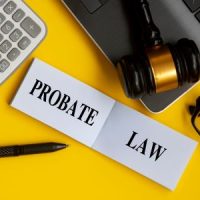How Disposing of Non-Probate Assets Differs from Probate Assets

Not all of a person’s assets pass through probate after they die. A common example of a non-probate asset is a retirement account like an IRA. The IRA is effectively a contract between the account owner and the institution that acts as the account’s custodian. This contract includes a beneficiary designation. Upon the account owner’s death, the institution is required to transfer ownership of the account to the beneficiary.
As a general rule, changing a beneficiary designation on a retirement account–which, keep in mind, is largely regulated by the federal government as opposed to the State of Florida–requires the account owner to follow certain procedures established by the institution. In other words, you cannot change a beneficiary designation through a will. And if you fail to strictly comply with the institution’s requirements, it cannot honor a change of beneficiary designation after your death.
Florida Appeals Court Refuses to Uphold Mailed–But Never Received–Change of Beneficiary Form
A recent decision from the Florida Fourth District Court of Appeal, Sobel v. Sobel, offers a useful illustration. This case involved an intra-family dispute over a deceased person’s IRA. The decedent transferred his IRA to UBS Financial Services in 2004. Under the terms of the IRA, the “last form accepted by UBS” before the decedent’s death would be controlling as to the beneficiary.
In June 2013, the decedent asked his attorney to prepare a new IRA beneficiary designation. The decedent signed the form. His attorney mailed it to UBS. But for some reason, UBS never received it.
Eight years later, the decedent passed away. UBS found no record of the purported 2013 change of beneficiary form. According to UBS, the “last form accepted” was filed in 2008.
The trustee of the decedent’s trust asked a Florida probate court to declare the 2013 designation the “last form accepted,” notwithstanding UBS lack of any record. The probate court sided with the estate. But on appeal, the Fourth District reversed, citing the decedent’s failure to comply with a “material term of the Custodial Agreement.”
As the appellate court explained, “substantial compliance” was insufficient when it comes to fulfilling the requirements of a contract such as an IRA agreement. In this cast, actual compliance meant UBS had to receive the change of beneficiary designation prior to the account owner’s death. And there was no evidence proving UBS ever received the 2013 form. Just because the attorney mailed the form to UBS did not prove the company actually received it.
Contact a Pompano Beach Probate vs. Non-Probate Assets Lawyer Today
It may sound hyper-technical to condition the distribution of a retirement account on whether a financial institution received a specific form. But this is often how the distribution of non-probate assets must be determined. If you are involved in a similar dispute involving non-probate (or probate) assets, an experienced Pompano Beach estate and trust litigation attorney can advise you on the law and represent your interests in court. Contact the office of Mark R. Manceri, P.A., today at 954-491-7099 to schedule an initial consultation with a member of our team.
Source:
4dca.flcourts.gov/content/download/2400398/opinion/Opinion_2023-0896.pdf

 Mark R. Manceri, P.A. is a boutique law firm that specializes in Estate, Trust and Guardianship litigation. These matters include Will and Trust contests involving lack of capacity, undue influence, forgery, improper execution and tortious interference...
Mark R. Manceri, P.A. is a boutique law firm that specializes in Estate, Trust and Guardianship litigation. These matters include Will and Trust contests involving lack of capacity, undue influence, forgery, improper execution and tortious interference...